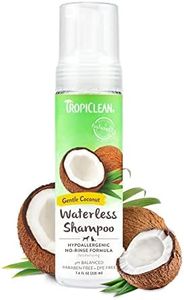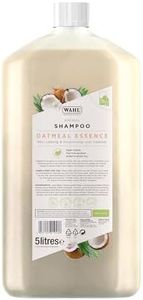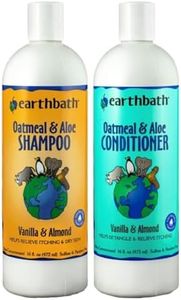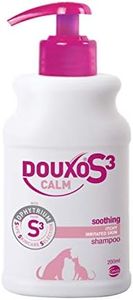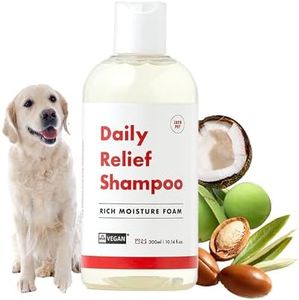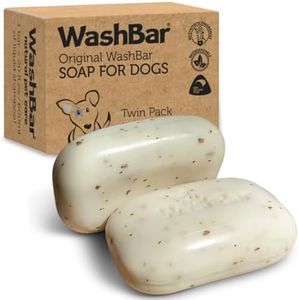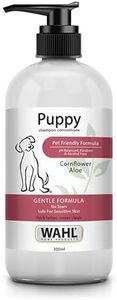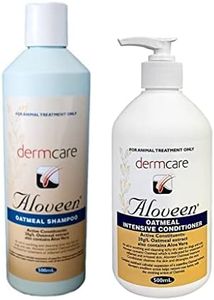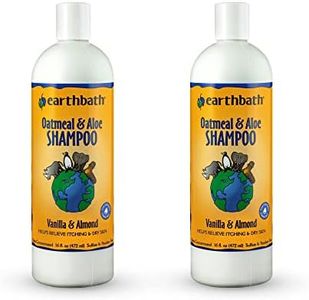We Use CookiesWe use cookies to enhance the security, performance,
functionality and for analytical and promotional activities. By continuing to browse this site you
are agreeing to our privacy policy
10 Best Hypoallergenic Dog Shampoos
From leading brands and best sellers available on the web.By clicking on a link to a third party's website, log data is shared with that third party.
#1
Winner
Buying Guide for the Best Hypoallergenic Dog Shampoos
Choosing the right hypoallergenic dog shampoo is crucial for maintaining your dog's skin health, especially if your pet suffers from allergies, sensitivities, or frequent itching. Because dogs have delicate skin and different breeds or individuals can have unique reactions to certain chemicals or fragrances, selecting a gentle, effective shampoo can make a big difference in their comfort and overall well-being. It's important to focus on shampoos formulated with your dog's specific needs in mind, considering ingredients, skin conditions, and any known sensitivities.IngredientsIngredients refer to the substances used in the shampoo and are arguably the most vital aspect when selecting a hypoallergenic option. Hypoallergenic shampoos avoid harsh chemicals, artificial dyes, strong fragrances, and common irritants. Some shampoos use natural or soothing elements like oatmeal, aloe vera, or coconut oil, which can help calm sensitive skin. When navigating ingredients, look for short, easily recognizable ingredient lists with minimal additives. If your dog has had allergic reactions before, check for specific triggers and avoid those. For dogs with known sensitivities or who get itchy from regular shampoos, always pick formulas designed for sensitive skin and, if in doubt, patch-test a spot before full use.
pH BalancepH balance refers to how acidic or alkaline the shampoo is, which is important because a dog's skin has a different pH level than humans. A shampoo that's too acidic or alkaline can disrupt your dog's skin barrier, leading to dryness, irritation, or infection. Most hypoallergenic dog shampoos are formulated to be pH-balanced specifically for canine skin, usually in the range of 6.5 to 7.5. To choose the right one, make sure the product is labeled as pH-balanced for dogs and not for humans, and always avoid using human products on dogs—it can upset their skin’s natural protection.
Fragrance-Free or Mildly ScentedThis spec refers to whether the shampoo contains added perfumes or scents. Strong fragrances can trigger allergies or cause irritation on sensitive dog skin, even though they might make the shampoo more pleasant for humans. Hypoallergenic shampoos are often fragrance-free or use very mild, natural scents less likely to cause problems. If your dog tends to scratch after a bath or has had reactions to scented products before, opt for fragrance-free versions. Otherwise, mildly scented options using natural extracts can be suitable if you want a subtle, pleasant smell.
Tear-Free FormulaA tear-free formula means the shampoo is gentle enough that it won’t irritate your dog’s eyes if it accidentally gets near their face during a bath. This is particularly important for puppies, breeds with sensitive eyes, or for owners who prefer to bathe their dogs at home without professional tools. To pick the right one, look for 'tear-free' or 'gentle eyes' on the label. If you have a squirmy dog or one who doesn’t love baths, a tear-free formula is a safer choice to make bath time less stressful for both of you.
Moisturizing PropertiesMoisturizing properties refer to whether the shampoo contains ingredients that help keep your dog’s skin and coat hydrated. Dogs with allergies or sensitive skin can be prone to dryness, which may cause flaking, itching, or discomfort. Hypoallergenic shampoos often include moisturizers like glycerin, almond oil, or shea butter. When navigating this feature, read the label for moisturizing or conditioning claims. If your pet has a naturally dry coat or develops flakes easily, a moisturizing hypoallergenic shampoo will help maintain skin health between baths.
Medicated or Non-MedicatedSome hypoallergenic shampoos are medicated, meaning they contain special ingredients to treat specific issues like fungal or bacterial infections, while non-medicated ones focus only on cleaning and soothing. Medicated formulas may include oatmeal with hydrocortisone, chlorhexidine, or antifungal agents. The choice depends on your dog's skin condition—use non-medicated if you’re just managing sensitivity or allergies, but if your veterinarian has recommended treating a particular issue, opt for a medicated hypoallergenic shampoo tailored to that concern.

